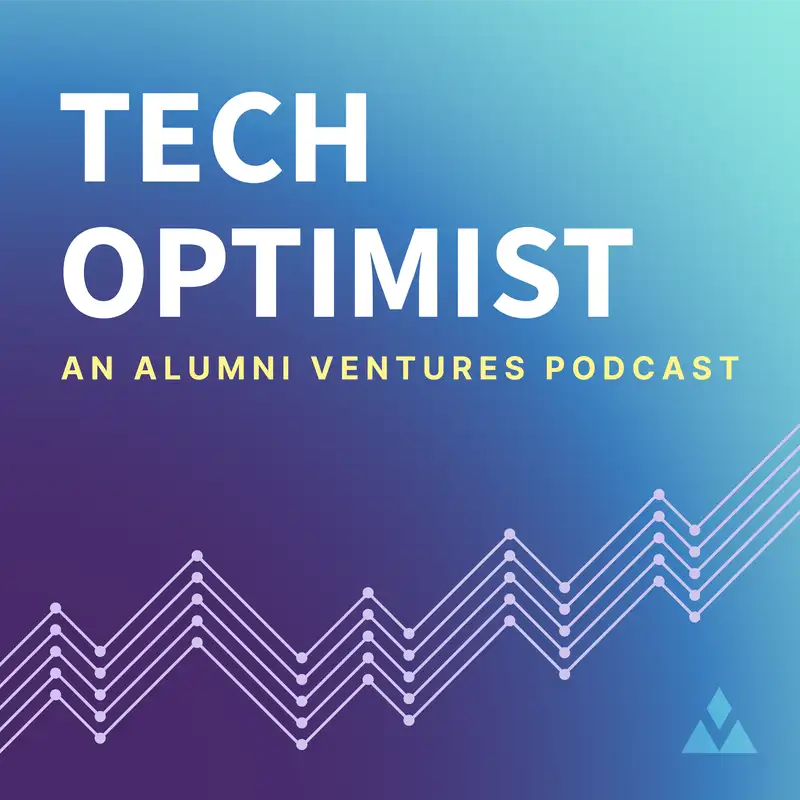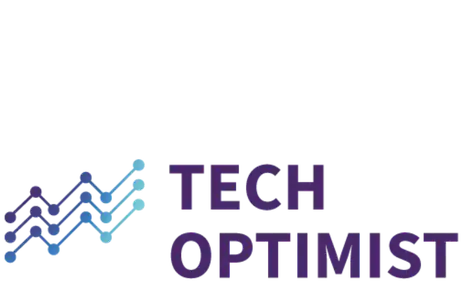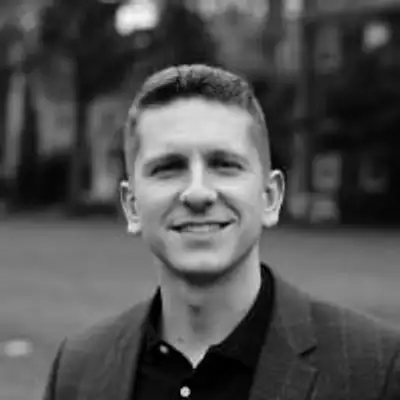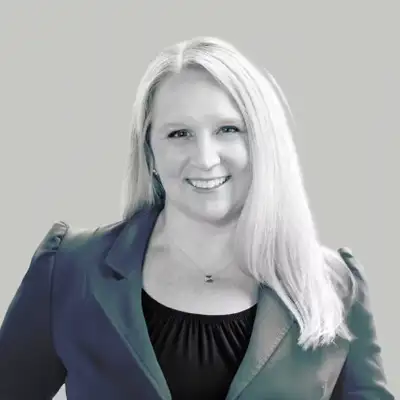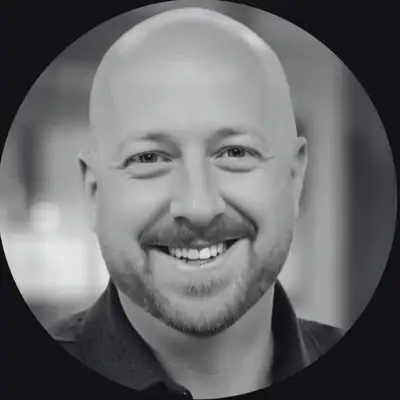#10 - GLP-1: A VC’s Personal Experience
Narrator:
In a world captivated by criticism, it's easy to overlook the groundbreaking technologies shaping our future. Let's shine a light on innovators who are propelling us forward. As the most active venture capital firm in the US, we have an exceptional view of tech's real-world impact. Join us as we explore, celebrate, and contribute to the stories of those creating tomorrow. Welcome to the Tech Optimist. As a reminder, the Tech Optimist podcast is for the informational purposes only. It is not personalized advice and it is not an offer to buy or sell securities. For additional important details, please see the text description accompanying this episode.
Hi everyone. Welcome to another episode of the Tech Optimist. Switching things up a little bit today. And this time Mike is actually the one being interviewed. So the interviewer is Grant Demeter. He's a principal here at Alumni Ventures and they're talking about the intriguing topic of Ozempic, a GLP-1 drug that Mike personally used actually. And so Grant and Mike are sort of talking about Mike's personal experience with the drug and kind of how this drug is sort of changing the investment world. They're sort of talking about it like an investment thesis and sort of what other future endeavors can come out of the success of Ozempic. So this is a really cool, insightful conversation between Grant and Mike and we seriously hope you enjoy.
Grant Demeter:
Hello everybody. My name is Grant Demeter. I'm a principal here at Alumni Ventures, and today I'm interviewing Mike on his journey with Ozempic treatment, a GLP-1 weight loss drug. We did a couple previous pieces on this with Ron Levin, managing partner on our team, where we talked about Ron's journey starting the drug and ramping up. Mike has recently ramped off and totally tapered off the drug, and so we want to counterbalance that with his story coming off and then close off with talking about some implications for the space more broadly as investors. So Mike, care to briefly introduce yourself and your professional journey?
Mike Collins:
Yes, so I'm the founder and CEO of Alumni Ventures started out in the eighties in venture capital and really my whole career has been at this intersection of technology and entrepreneurship and venture capital. And I, pretty active investor obviously through Alumni Ventures, so was very curious about this technology and really I think a lot of people... I just hit 60, was an athlete in college, put on a pound here, pound there, COVID, and you turn around and you're probably 40, 50 pounds over what you really should be. And so I had been following the technology in the space and was starting to see numbers go not in the direction I wanted in blood sugar and metabolic issues related to heart health.
And so I thought it was the right choice for me and worked with my GP and frankly had to bring him along a bit I think. I think I had done a lot more work and research on the drug, but we agreed that we were going to give this a try and I did it in the context grant of really a pretty holistic approach to health. So good sleep, I've always been a very disciplined sleeper. Exercise, part of my daily life. So it was a tool for me and actually went on the Eli Lilly version of the GLP, Mounjaro.
I think Ron started his journey even before the FDA improvement of the Eli Lilly drug. But I found that I was really a super responder and I started about six months ago. I lost really 50 pounds in six months, kind of hit my target weight and then I was learning and studying it more as I... Beyond just kind of controlling a blood sugar and food noise and things like that, there was increasing things that were coming out for additional potential benefits of this drug. So I actually responded on kind of a very low dose and really had no side effects. Again, everybody's mileage varies I'm sure, but it was really a profound experience for me, just not really... I think the idea of thinking about food noise, craving, snacking, all of that stuff is fairly hardwired and in a modern society kind of very difficult.
It really helped with. And then the tapering off was really... I really reached my goal weight and then I had foot surgery coming up and one of the things that they really... If you have a surgery, they really wipe you off of these drugs for three or four weeks beforehand. So I went off it for a month before my foot surgery. And I would say my experience was, I definitely noticed not a lot for the first week or two, but as we hit the one-month period, I was starting to definitely feel food noise creeping back into my life and had put on a couple of pounds, nothing crazy. I was still in my kind of target weight zone. But I think one of my mindset changes was really thinking of this, and this was kind of the Oprah show too hit on this, is like we tend to think of weight loss as a character issue and a discipline issue. And I think that's really misframing it.
Ludwig Schulze:
Hi, just a brief interruption to introduce you to HealthTech Fund from Alumni Ventures. Alumni Ventures is one of the most active and best performing VCs in the US and we have raised over a billion dollars from more than 10,000 individual investors. With our HealthTech Fund, you'll have the opportunity to invest in a portfolio of around 20 HealthTech startups from transformative healthcare services to groundbreaking diagnostics. Our founders are paving the way for a healthier future. To learn more, visit us at av.vc/funds/healthtech.
Mike Collins:
And I think for people, this is kind of more of a chronic disease framing is more appropriate. And yes, some people can smoke and not get lung cancer kind of thing. And some people can eat like crap and not exercise and be thin, not necessarily healthy I don't think, but they could be thin. But I think other people are very disciplined, try their best and they're dealing with some dysregulation in their body. And this is a medicine now that can really change the frame where this is a treatable chronic condition. And I think that shift hasn't happened in our culture. I know that hasn't happened in people in my life that this is kind of you just cheating or why don't you just diet? Or why don't you just exercise more? And my experience has been one that is really a misunderstanding and a misframing of the problem and the solution.
So yeah, I mean I think again, all these things are personal, but I think that you want to be on as few drugs as you can. We all understand what a healthy lifestyle is. We also understand that the data suggests is no alcohol in your life, but I think people want to enjoy life too. So having a drink now and then I've decided is... I'm going to have a drink now and then even if it isn't maximizing that one vector. So I think it is a tool. I will say again, anecdotally now I think in my extended family have... I think I was the first to go on it, which not surprising, but there are now I think four extended family members that are either on it or about to go on it who are all dealing with either significant kind of blood sugar issues and/or obesity, BMI issues.
And there's huge shortages and that whole dynamic is going on, but I have decided I'm going to stay at my target weight, I'm going to feel, and I'm going to take as little medication as I need to stay there. So I am planning to go on it at a very low dose and typically people take a shot week on Mounjaro or Zepbounds. I think I'm going to try every two weeks kind of thing, which again, approval from my doctor to give that a go when I'm off of this surgery thing. Yeah, that's my journey. Again, not giving any medical advice here, but just sharing my one person's thoughtful experience on it.
Grant Demeter:
Thanks for sharing. Sounds like there's a couple of things that are unique about your journey. The first one, which makes sense as a technologist, you discovered this product actually before your doctor was that familiar with it. And so you had to co-bring your general practitioner along for the journey. And as I understand, these are in some ways administered and oversaw journeys, in that a doctor has to have oversight and long consultative process. It's a weekly shot. So what was your consultative process with your doctor and then you had this foot surgery upcoming. Did you taper off with the doctor's advice? Did you go cold turkey?
Mike Collins:
Yeah, so again, I had been studying this for probably a year and I have pretty good access to... Because one of the first things you say is like, oh, this is new. I don't want to be a lab rat. What are the side effects? Am I going to be on this for life? And again, I have access to people that not everybody has access to. And as I studied, I got very comfortable that this is a class of drugs that has actually been around a long time and for whatever purpose, but they've been in lots and lots of patients for decades, not decades, a couple of years.
And with anything you do in life, it's a risk reward and a percentile. And I felt very comfortable in that kind of trade-off. Because my first encounter with my GP was like, "Oh, why don't I set you up with a dietitian? Why don't you be more rigorous in your exercise?" So I had to kind of say, "Hey, I know what's going on with diet." Most educated people, most of our listeners know how one should eat. And again, I've tried diet exercise repeatedly like a lot of people, it's very hard. It's very hard to keep weight off once you lose it. There's kind of a natural plateauing curve, etc. But so yeah, I had to bring him along through that process and again, had pretty good data. And again, I don't want to say it was convincing him, but it was just like that was not... The average GP I don't think has been adequately trained about this stuff yet. It is too new and too much in the culture, but I think it's coming and I think it's coming pretty quickly.
So yeah, I think it was a matter of bringing them along. And then it was clearly we worked together on scheduling this foot surgery. It was well known that this is a drug that you want to be off before a surgery like that. So I had already gone tapered down to the lowest dosage. So it was easy for me to just say, "Hey, I'm going to stop it, just not take my shots for the month that I'm having the surgery." And then just again, being super data centric, I look at a bunch of my numbers, I do a lot of independent testing and just seeing it's not just the weight, but how are my sugar numbers, how are all these other risk factors going?
Where I am today, and again subject to change in humility, I think this is a drug that I'm going to want to be on longer. And want to be on at kind of a very low maintenance dosage to be sure that all of my important numbers are where I want them to be and my weight is where I want it to be. But I would also say, Grant, that there's good positive fly wheels in losing 50 pounds. Exercise is easier. I don't snore anymore. After I go for a run, my knees don't hurt. I don't have a backpack with 50 pounds on it. It's extra.
And again, managing protein, resistance training, water, all of that stuff has been, I think part of the reason that I've been successful. Plus just genetically we're all different. I think people respond differently to every medication. So I think from a bigger trend perspective, I think there's several things going on. I think this is a great example of personalized medicine, which I think is a trend meaning, oh, let's take the fact that half of the population is obese, they should all go on this drug and we are going to expect the exact same outcomes is kind of how we treat medicine. And it's not that. And I think that's a perfect example of you're going to have people that are like me, a super responder and then you're going to have other people who for whatever reason have more side effects or this drug only works at much higher dosages.
So I think it's just like that's the way we are as humans and so much of our healthcare is kind of still industrial and here's the standard of care and everybody is the same far too often. I've talked about before, which is I think this is a drug category that has very profound implications for investing. I mean, when you have half of the population overweight and you have a kind of food industrial complex feeding it, and all of a sudden people are not craving chicken wings while they're watching the football game, how does that change food? How does that change exercise? How does that impact travel? So I think there's a lot of knock-on effects that are coming. I think the other thing one really has to understand, which is the pipeline of drugs in this category now is very, very robust.
And we're talking about pill form and we're talking about variations where I think again, over the next five or 10 years, just if there was broad implementation of these drugs as is, you're going to see huge impacts. Let alone what you're going to see because there's so much money and value available in this drug category that I think you're going to have a huge area of investment. And so I think in 10 years, I'm not saying for everyone, but I think one's weight is going to be much more of a choice than it has been in the last 100 years. And I think that has huge implications for our society, to the positive mostly.
Grant Demeter:
I would draw a parallel here with the advent of SSRIs, which are used to treat anxiety, depression, and other kind of forms of mental illness. When those initially came out, they were seen as a crutch or when they're not seen as a crutch and they started to become normalized, they were seen as a way to get back to baseline and then wean off those things. Now, and this varies from practitioner practitioner, we see people on SSRIs for extended time periods. Now over time though, we are starting to see that these SSRIs do come with long-term longitudinal side effect profiles and they make you more susceptible to things like dementia. On one hand, we do have some precedents of GLP type drugs being used for longitudinal long-term time periods. On the other hand, we don't for this specific modality of the drug.
And it seems based on what you shared here that a lot of the people who I've spoken with see this as a way to get back to baseline. I'm just going to take it for a little bit, get to my target weight, wean off it and try to see if I can hang onto the weight. But you're a proponent of proper normalization of this being a long-term weight management, and not just weight management, but broader health management treatment, which means that you're planning to take it for the foreseeable future. How do you feel about maybe unknown long-term effects of this drug and you being an early adopter and what do you think about that?
Mike Collins:
No, I mean I think this is a classic risk reward analysis. My framework is we know very clearly the long-term risks of obesity. Just taking that one particular thing, cancer, heart disease, diabetes, like the three horsemen of death right there. So that is well known. So you have a known very strong risk on one side of the ledger and potential long-term risk on the other. So I think that is part of the framing that one has to consider. Two is we are really in the early days of this class of drugs. So my view is that there will be future versions of this drug that are more targeted, that have fewer side effects, that... One of the absolute things is when you lose 50 pounds, you're going to lose some muscle mass, which is a negative. You want muscle mass, right?
There are versions in the pipeline now that give you all of all these positive things versus the negative things. There's so much money to be had here. I think there are a lot of companies and a lot of research going to go into this category. So I personally don't think I'll be on even a low dose of Mounjaro more than a few years before I'm on the next generation. And this is part of what people diagnosed with cancer often deal with, right? It's like I have a disease, I have a potential cure that comes with some side effects, and I would obviously not want to be on chemotherapy long-term, but one, I need to stop the risk reward of not going on the drug is one. And then two, if I can just survive another five or 10 years, there may be new options medically for me.
So I think you have to view option value of not being obese until the next generation of things go on. I will also say is I don't think it is so black and white that I take it to lose weight and then I go off of it and the weight for all people goes right back on. I think there are some, the studies basically say there's a cohort of people that are able to keep it off without the medication. There's a group of people that are able to keep it off at a very low dose and over a long period of time and they may decide, I can be off of it for two years, go back on it for six months. I don't have to lose 50 pounds this time. I have to lose 10 pounds this time. So again, I think it is very customized. I don't think that there are definitive answers. I think this is very personal between you and what you want and your risk reward and the advice of your physician.
But again, just kind of sharing my own calculus of risk reward, I think again, it comes into this kind of false framing that this is something that you can 100% control as a person. And listen at 28, I could control it too. I could eat whatever I want. I could sleep as much as I want. I could do whatever and eat 6,000 calories a day and I was at 3% body fat. That system was really well-tuned. At age 30, less tuned and by age 60 I needed help. And I just don't think people should be shamed or understanding that they don't need medical help in the same way, listen, as societies, you point out, Grant, we went through this with kind of mental health, which is just like we've evolved in our thinking of that as a disease.
I think we've thought through that. As with addictive, certain addictions, this is chemistry, brain wiring, very complicated stuff. And I think we are learning that one's appetite, one's metabolism, the way one processes food, food noise, the way the body regulates. You go on a diet and all of a sudden your body starts saying it increases its appetite and lowers your metabolism. So it's a kind of system dynamic approach to thinking about things and making it less about one's character.
Narrator 2:
Ever wonder how the ultra wealthy invest their money? They often back startups before they go public through venture capital. Now individual investors like you can too with Alumni Ventures, visit av.vc to get started.
Grant Demeter:
Very well put. You mentioned some potential predictions for the future. You even mentioned your personal experience with exercise. Some people feel that after a course of these GLP-1 drugs and people are lighter, they'd be more likely to exercise and enjoy their new bodies. And some people feel that, hey, at that point, what's the point of exercise? I'm already feeling good and looking good. The same thing people say for food or eating out. On one hand you'll be craving food less. On the other hand, you may be more apt to be seen out and about more excited to be spending time with friends outside of the home and have higher energy levels to do more social activity. There's people on both sides of each these things. What are a couple predictions that you have around food, fitness, health, and other parts of broadly American life, maybe 10, 20 years down the line as a result of these drugs?
Mike Collins:
Yeah, I mean I think food's going to change. I think people will end when you eat less food and you have less food noise, it becomes a more rational decision versus an emotional decision. So again, I'll speak for my own experience. The food quality that I've craved and eat has gone way, way up. I still go out and have dinner with friends, but just the portion that I'm interested in eating. I enjoy food. It doesn't affect your taste or food enjoyment. For me, it was just I'm satisfied with less. And so there are little hacks. I tend to prefer tapas restaurants now that I eat less frankly. But I think people definitely are going to continue to go out. I think you have a higher energy level. I think you develop confidence many people when they lose weight. I think you want to exercise more.
I think it's the joy of exercising and movement and the ability to go on a hike without, again, just feeling kind of overwhelmed and achy and tired. I think sure, you're going to hear anecdotes about the other side, but I really think that this is going to end up in more active social healthy people generally. I think this is just tamping down on something that is in your monkey brain, which is for hundreds of thousands of years, we as humans, as an animal have dealt with scarcity. And so there was a survival hard-wiring that went into things like calories and sugars and fats and all kinds of things that were dopamine.
And so for me, this kind of just tamps down a little bit of evolutionary overzealous behavior that we don't need anymore. So for me it's kind of more just, again, putting on the rational brain and just not dealing with engineered food and evolution that has really taken that system out of whack. I mean, I don't think half of our culture is overweight because people are lazy. I think that there is a lot of evolution and a lot of environmental factors that make it practically impossible for people as they get older. They have kids. I think that this is something that you're going to see more good things than bad things come out of, but I think it's going to be change for sure. I often think about where does one invest? If I'm right about this thesis, how do you invest in it? And so I think there's a category of this area of peptide hormones that I think is very promising.
I think we're starting to see data now on Parkinson's disease and sleep apnea and all of these other things, but I think there's a lot of work to be done in antimicrobial work. I think there's cancer work, I think there's chronic disease issues. I think there's a class of drugs, broadly speaking, coming out of this thrust that I think are going to be very profound. So we're definitely interested in that space. I think there's a class of what I'm going to call telemedicine because as we talked about, prescribing the drug is one thing, but if you've been morbidly obese or significantly obese for the last 30 years and all of a sudden you lose a hundred pounds or more, there is a whole set of other things that you have to deal with as a human being. So I think having a telehealth consulting, I think there's opportunities there where you really are dealing with the entire person. And it's like you say, it's not just take the drug, it is how do I eat now?
How do I prepare food with my family now? How do I exercise? How do I deal with the social aspects of not being the fat person in a crowd anymore? I think there's a lot to unpack there that I think creates a lot of opportunity. And then always, Grant, it's not incumbent upon the VC to come up with all the great ideas, but I do think if one has a prepared mind that this is a fairly foundational, impactful technology. Now you're receptive to when entrepreneurs come and pitch you or you go to Y Combinator or go to an incubator and you're hearing about a team that is a pursuing something, I think you now we all have hand holes to be like, okay, yeah, that really resonates with my framework of what the world's going to look like 10 years from now. So I always leave for half of the investing budget to be just prepared mind.
Grant Demeter:
Well put. Well, I think I conceptually agree with you that right now in the early stages, the value is going to be primarily captured by the therapeutics players, then captured by the service providers around the therapeutics players. And then once they become fully priced, we're going to start to see more macro level strategies around the downstream impacts of things like sport, fitness, et cetera. And those are going to be the opportunities and it's up to us to spot them. [inaudible 00:33:42] where a multi-stage, multi-sector investor with the opportunity to do that.
Mike Collins:
Yeah, no, I mean, and just an aside to wrap up, which is with my foot surgery, I was chatting to the surgeon about it, and it's like he was mentioning to me, and this is kind of the second order, third order effects. He goes, one of his classmates is a plastic surgeon, and just the huge uptick in people who have lost significant amount of weight now basically are interested in getting a facelift because they've lost a lot of weight in their face now, and it's like they actually look like their age as opposed to being puffed up because their face is fat, in essence. So that's an example of who'd have thought this would've been a boon to plastic surgeons, but it seems to be. So hadn't even thought of that. But well, thanks for the time, Grant. Interesting conversation.
Grant Demeter:
Thank you, Mike. Appreciate it.
Mike Collins:
Okay, be well talk soon.
Grant Demeter:
Take it easy. Bye.
Mike Collins:
Bye.
Narrator:
Thanks again for tuning into the Tech Optimist. If you enjoyed this episode, we'd really appreciate it if you'd give us a rating on whichever podcast app you're using and remember to subscribe to keep up with each episode. The Tech Optimist welcomes any questions, comments, or segment suggestions. So please email us at info@techoptimist.vc with any of those and be sure to visit our website at av.vc. As always, keep building.
